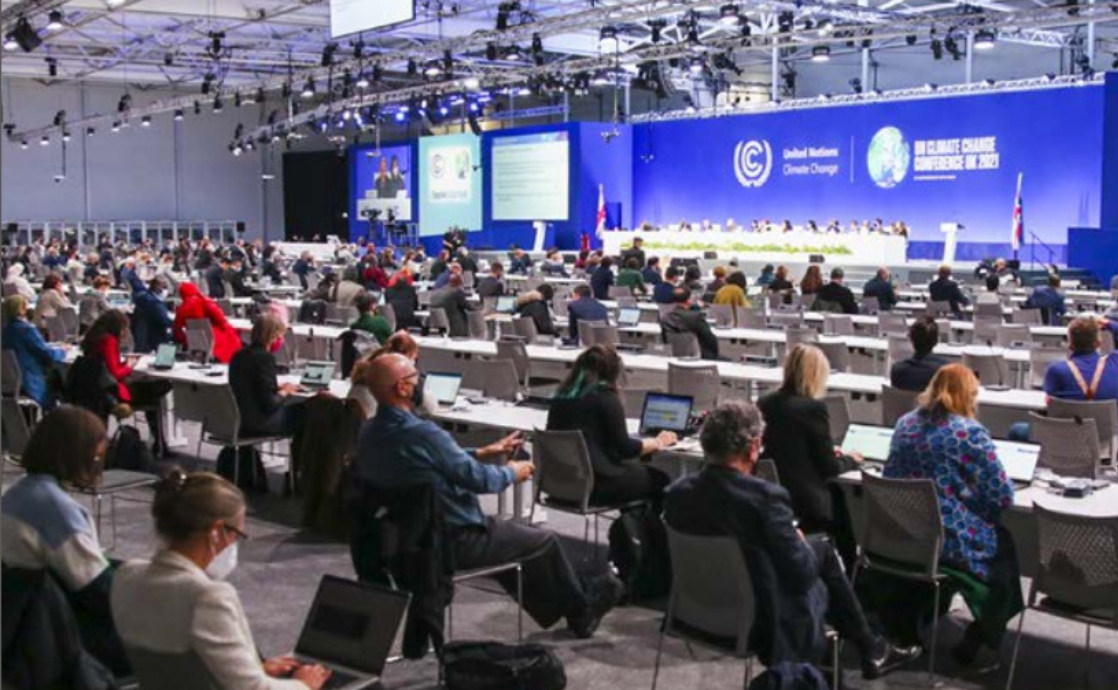The views expressed in our content reflect individual perspectives and do not represent the authoritative views of the Baha'i Faith.
Numerous actors have a part to play in building a more sustainable world. Local communities can do much to foster collective action and multiply the innovative capacities of their members.
Youth consistently demonstrate an openness to new ways of organizing society, a willingness to learn through front-line action, and a readiness to commit themselves to high endeavors and the well-being of future generations.
Business and industry, as linchpins of the contemporary economic order, can make constructive decisions whose benefits ripple through societies and landscapes across the globe.
The role of national government, however, is unique and preeminent today. At this point in human history, the nation-state is one of the fundamental units of the global political order. States therefore have an indispensable role in addressing transnational environmental challenges.
The mandate of the state, as steward of the common good, is long-term in nature, transcending electoral cycles and political terms. Effective governance ensures the flourishing of all within a jurisdiction, for generations to come. The state also bears crucial responsibility for governing the commons, whether within its own borders or in collaboration with other institutions beyond them, for example in managing and caring for public goods that benefit all.
The full capacities of the state must be brought to bear on environmental challenges.
Remaking entire industries across various sectors of society is the work of decades, involving vast quantities of financial resources, jobs, and physical infrastructure. Vital, therefore, will be government’s role in developing long-term plans, advancing them methodically over time, and creating the conditions in which necessary advances become feasible. In some cases this might take the form of subsidies, compensation, regulatory adjustments, or other means of incentivizing needed action. At other times, the norm-setting role of government and individual leaders will be required — explaining, encouraging, praising, calling to action.
In all, institutions of governance are uniquely positioned to foster and sustain generational transition. Establishing new qualities and attitudes toward leadership will be essential, if states are to effectively address environmental concerns.
Personal character is central in this regard and progress would be seen in leaders approaching public service as a responsibility and not a path to personal gain, demonstrating accountability to ends higher than electoral victory or personal advancement, and taking decisions that are difficult but aligned with the greater good. Such instances of moral courage stand among leaders’ most enduring achievements and will be remembered long after the calculations of any particular moment or political climate have faded.
Pessimism about the role of the state has grown in recent years, and it is true that many have suffered when governments have been unable or unwilling to fulfill their functions — when the role of establishing rules and standards has been surrendered to those with vested interests; when service provision has been privatized in ways that subordinate human well-being to the demands of the profit motive; when political corruption and expediency have sacrificed the common good to personal advantage. Yet such reflections are less an indictment of government itself than a reminder of the unique power it holds. All, therefore, have an interest in ensuring that government executes, as fully as possible, its functions as promoter of the public trust. Good governance creates the context in which the private sector, the scientific community, civil society, and others can make their highest contributions.
Good governance allows the power of action to be unlocked at the level of individual initiative and to surge at the level of collective volition. Good governance creates the context in which the private sector, the scientific community, civil society, and others can make their highest contributions.
The Locus of Decision-Making
In an age when global processes are felt equally within villages and across continents, sustained attention will need to be given to determining the appropriate locus of decision-making. Key in this regard is the principle that decisions should be made at the level at which optimum results can be obtained.
Fidelity to this principle would imply, in many cases, a profound devolution of power and authority to local communities and governing institutions. Decision-making processes will need to become far more inclusive, local, and participatory in the coming years.
Every population has the right and responsibility to mark out its own path of progress and each has a vital contribution to make in building a more sustainable civilization. Moreover, experience has demonstrated that without the commitment of those whose lives are affected, programs and policies struggle to take root in the populations on which their implementation depends. Complementing trends toward localization, appropriate decision-making also requires action to be taken at levels that transcend the nation-state, when necessary.
Numerous environmental challenges are transboundary in scope and effect, and thereby unsolvable through legislation at the national level alone. Legitimate concern for national interests must therefore find expression within global structures that facilitate effective and coordinated action in service to a prospering international community.
The only viable way forward lies in a system of deepening global cooperation.
The efficacy of efforts at any one level depends on the quality and reciprocity of interlinkages between them. Policy-making at the national or global level can become abstract and theoretical — and thereby potentially irrelevant or counterproductive — if disconnected from conditions at the grassroots. Similarly, initiatives at the community level will remain limited if they are not connected to global processes concerned with humanity as a whole. Structures will be required, then, to facilitate the transfer of knowledge and insights as they are generated through practical experience and analysis.
[The principle of the oneness of humanity] insists upon the subordination of national impulses and interests to the imperative claims of a unified world. It repudiates excessive centralization on one hand, and disclaims all attempts at uniformity on the other. – Baha’i holy writings.
Proposals for Exploration
States’ responsibilities to advance the well-being of their people — ultimately grounded in the flourishing of humanity as a whole — must be paramount in the formation of public policy. Decision-making fora, therefore, need to be structured in ways that ensure states’ active advancement of the common good over other, more limited concerns.
Many spaces in which law and policy are determined today are heavily influenced by other actors motivated at least in part by interests such as the accumulation of financial profit or political power. Mechanisms are therefore needed that would ensure that such actors — whether multinational corporations, media entities, technological platforms, special interest groups, or others — would be included only to the degree that their participation bolsters long-term sustainability and enhances, rather than undermines, the good-faith efforts of the representatives of the people. In the context of the United Nations this could, for example, take the form of policies that ensure preferential treatment or undue influence is not accorded to non-state actors with access to outsized financial or other material resources.
Gaps between the scale of action needed to address climate challenges and the measures actually undertaken are often attributed to a perceived absence of financial resources. Yet the prudent mobilization and expenditure of resources to advance the common good, at scales commensurate with relevant needs, is a fundamental responsibility of the state. Governing institutions therefore bear a critical duty toward both present and future generations.
This responsibility confers on states a moral and ethical mandate to raise resources sufficient to address pressing and future requirements, with due consideration for standards of justice, capacity, and responsibility. It also requires that those resources be spent in furtherance of the well-being of humanity — and not in subsidizing unsustainable or destructive patterns of life. Expanding such responsibilities to the global level, in addition to their clear implications for national policy, would require significant adjustments to economic arrangements between countries, not least in taking the steps required to ameliorate the gross and destructive disparities of wealth between them. A variety of measures have been offered over several decades toward this end, such as a mechanism to ensure global tax coordination or a framework for regulating illicit financial flows. If implemented thoughtfully, such proposals could do much to utilize well the available pool of global resources.
The World that Beckons
Movement toward this vision has begun; its momentum is gathering. A flourishing global civilization in harmony with the natural environment is a vision toward which growing numbers are laboring.
The world that beckons is one of integration and balance, beauty, and maturity.
It is a world with a redefined sense of progress, filled with communities and individuals working together with the support of institutions toward the realization of their highest aspirations.
It is a world increasingly relieved of the destructive moral compromises — social, economic, and environmental — that have so often been asserted as necessary to progress.
Movement toward this vision has begun; its momentum is gathering. Lofty ambitions have been articulated and action is being called for on scales unseen. Yet the pace of transformation has not, so far, risen to the demands of the moment.
The range of options available to make the adjustments necessary will only narrow if action is deferred to the future.
Will humanity act on the truth that its own destiny and that of the planet are irrevocably intertwined? Or will still greater calamities be required to move it to action? The gulf between intention and action is one of the central challenges facing humanity today. This gap can be bridged; individuals, communities, and nations are contributing their share toward this goal every day. Yet for action to rise to the scales required, far stronger consensus and collective will among the nations is needed around the values demanded by the current stage of humanity’s development. It also calls for much greater resolve in putting those values into practice, recommitting to that which is beneficial to the common good and discarding whatever stands in the way of answering the moral and practical call of the present hour.
This is a high endeavor indeed, and its benefits a priceless legacy that must be left to the generations to come. Let us join together in rising to its demands.
















Comments
Sign in or create an account
Continue with Googleor